Since 2021, the College Debates and Discourse (CD&D) Alliance has proudly partnered with The Fund for American Studies (TFAS), a Washington, DC-based organization with a stated mission “to develop courageous leaders inspired and equipped to protect and advance the ideas of individual liberty, personal responsibility, and economic freedom in their communities and throughout the world.”
Each summer, TFAS brings together more than 300 students from colleges and universities across the country, immersing them in internships at NGOs in the nation’s capital and providing them with extensive professional development opportunities.
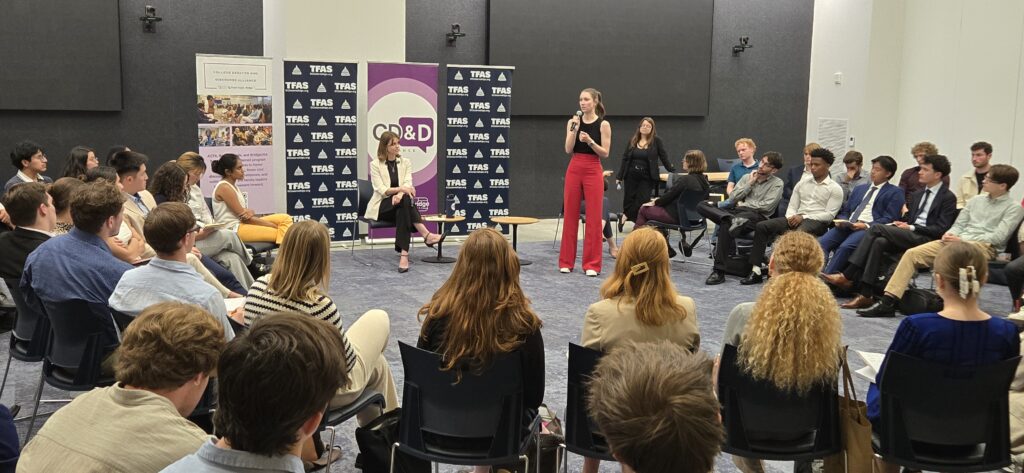
During the first four years of partnership, the CD&D team was honored to co-design and lead an extensive series of Braver Angels debates for TFAS students, immersing them in discussions in which they could express their views respectfully and listen deeply to better understand each other’s perspective.
This past summer, TFAS leaders decided to try out the newest form of CD&D programming: A Braver Campus Dialogue (ABCD). More than 300 students divided into four cohorts based on their particular “track” or area of interest, and engaged in dialogues centering on topics that were carefully conceived for each track:
- International Affairs – Under what circumstances should the U.S. provide international aid and development programming, and to what degree?
- Journalism and Communications – In the age of fake news and misinformation, how can we restore public trust in journalism and media?
- Business and Government Relations – What is the role of US government in regulating the development and advancement of AI, with consideration for potential downsides such as environmental impact and job displacement?
- Public Policy and Economics – What is the most economical and ethical way to reform the U.S. immigration system to address undocumented immigration?
Each ABCD session was guided by an experienced moderator who used an amended form of parliamentary procedure, similar to the style of Braver Angels debates. Students were invited to pair up and reflect on the topic, present their views, propose creative solutions, and ask questions of their peers. Throughout each dialogue, they followed four core norms introduced by the moderator:
- Listen to understand, not to respond.
- Do not interrupt.
- Represent yourself, not any particular group.
- Speak to and critique the perspective, not the person.
Hosting Braver Campus Dialogues proved to be a key part of the summer experience for our TFAS students. This format allowed them the opportunity to delve into an issue with the aim of coming up with real solutions. The discussions were spirited but respectful.
Joseph Starrs
Senior Director, Journalism and Communications and DC Programs, TFAS
TFAS Journalism and Communications student Gillian Paseka offered a brief review of discussions that unfolded in two of the summer dialogues, which took place at the Arlington, Virginia campus of George Mason University:
On June 17, TFAS Journalism and Communications students convened to discuss how we can restore public trust in journalism and media in an age of fake news and misinformation. There was slight hesitation at first, but after a few brave students spoke, the floodgates of conversation began to open. Students identified several contributing factors to public distrust in journalism, including the absence of laws enforcing what can be published, false or misleading headlines, and misunderstanding of the journalistic profession.
Once initial concerns were shared, the crowd split into small groups to brainstorm possible solutions to the problem. After a few minutes, the moderator brought everyone back together and invited volunteers to share their thoughts. The first students to speak proposed large-scale industry and societal reforms, from the establishment of a nonpartisan, fact-checking group to review media content and enforce high journalistic standards to the reshaping of the political system itself. Fellow students questioned the feasibility of large-scale, nonpartisan change, especially in the current political climate. Others pointed out that news outlets like the Associated Press (AP) already fact checks its content, and wondered how many people actually refer to these tools.
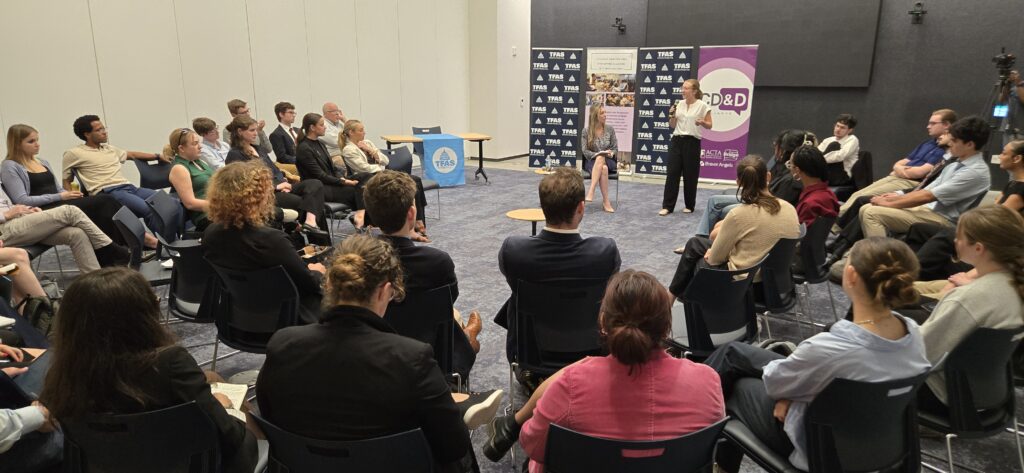
Another solution focused on incentives for desired journalistic behaviors. If journalists know that they will be held responsible for spreading false information, whether through fines or through publication delays, then they will likely hold themselves to a higher standard of reporting. While some students agreed that this solution might lead to lower levels of fake news, others expressed concern that this proposal teeters on the side of censorship, which is an undesirable outcome as well.
This shifted the conversation towards the public’s role in fostering fake news. One student asked, “What if fake news is not the fault of journalists? What if the continuing presence of fake news is our fault?” The student proposed that we teach people, starting at a young age, how to follow and read the news effectively. This knowledge and media literacy could then be spread to all citizens, ensuring that the public remains the first line of defense against fake news.
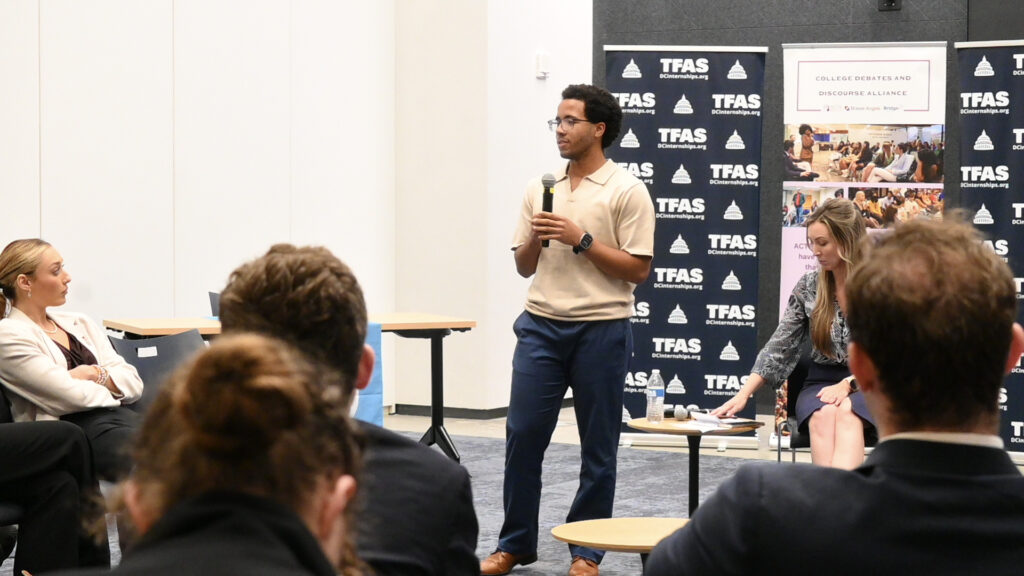
Another student took this idea further by suggesting that we can avoid fake news traps by returning to books and other established knowledge sources to have a common basis of information. This sparked a lively discussion leading up to the end of the event.
In the closing debrief, students expressed appreciation for hearing ideas they didn’t agree with but enjoyed being in a room of such diversity. One student commented that “Starting this dialogue is the future of Journalism and Communications,” adding that everyone in the room had begun a conversation essential to fueling their future careers.
On July 15, the TFAS Public Policy and Economics cohort met to consider the most economical and ethical ways to address undocumented immigration in the United States. Following the ABCD format and guidelines, students were encouraged to speak for two-minute increments about what they believed was the heart of the issue. After small group reflections, they acknowledged that finding a solution is difficult, but there must be some movement toward change.
Tryston Weiss, a student from Western Carolina University, observed that radical opinions got the conversation going, which inspired more moderate voices to speak up as well. “I think that was very important to see,” he said. “Oftentimes in the media, we just see people expressing one of two sides, and you don’t necessarily see that most people feel very moderately about issues like immigration. I think that a conversation with moderate voices was very important.”
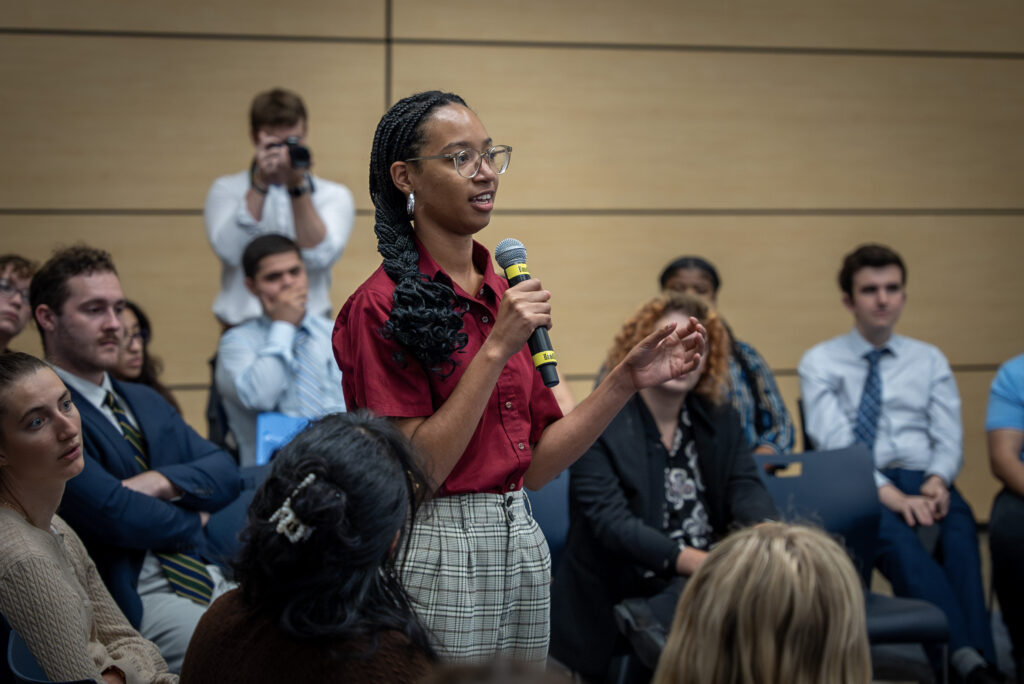
Several students expressed concerns about targeting criminals rather than undocumented immigrants. Other speakers, including an international student, expressed optimism about immigration and living in America. They argued that immigrants contribute greatly to the nation, both materially and culturally, and that immigration law should be reformed to support more, not less, immigration. This would include adopting an “open borders” policy, utilizing the economic talents of immigrants, and improving visa procedures and background checks.
Oftentimes in the media, we just see people expressing one of two sides, and you don’t necessarily see that most people feel very moderately about issues like immigration. I think that a conversation with moderate voices was very important.
Tryston Weiss, Western Carolina University
Another speaker took an alternative stance and called for a mass deportation. They had concerns with an excess of undocumented immigrants, arguing that immigrants’ education levels would not match U.S. education standards and lead to cultural and economic disarray. Other speakers took a moral stance in favor of immigration, arguing that many immigrants see America as a safe haven when leaving unsafe environments.
Much of this solution-oriented conversation focused on systemic reform to make the citizenship process easier. One student asserted that the intense processes could dissuade highly skilled individuals from entering the country. Reform is a national obligation, not an option, they said. When pressed about the licensure and credential differences between nations, the student agreed that a policy change would be needed to allow those with qualifications to be streamlined into the medical and legal fields. Another student proposed lengthening and expanding international student visas and creating a process that facilitated individuals’ transition into the U.S. workforce. When students shared concerns of international students using U.S. education as a gateway for disclosing secret information to their home countries, the speaker said that they didn’t see that as a major problem – as many international students come to the United States without ulterior motives, and much of what they learn in college can be found in any public library or archive.
Some students expressed hesitation in admitting immigrants with varying religious backgrounds, especially those who have different views on women’s rights. Other students responded that the United States protects religious freedom, and restricting immigrants based on differing values would undercut the Constitution. Personal autonomy and one’s liberty, even as an immigrant, should not be altered, they said.
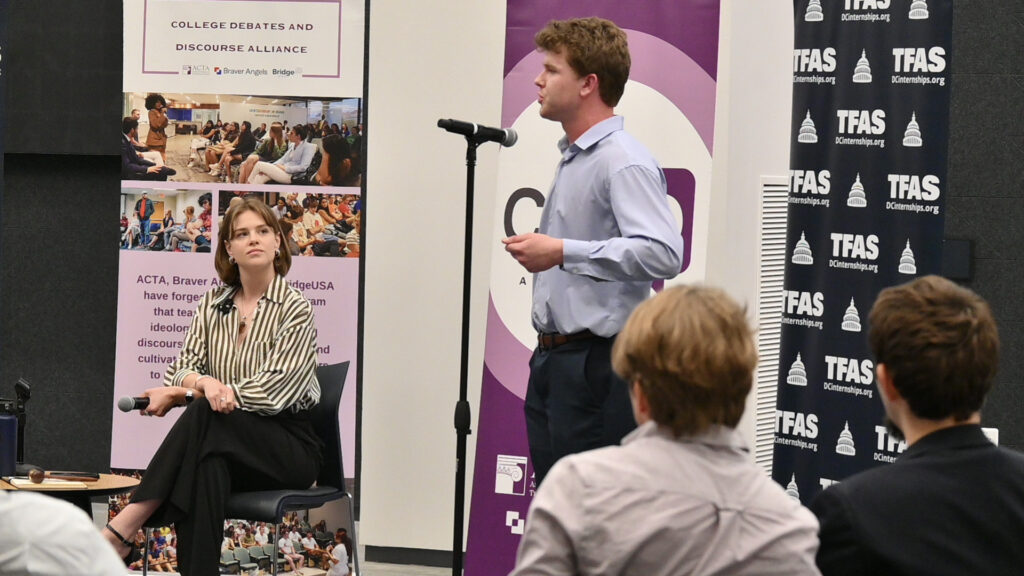
At the end of the dialogue, students raved about the format. Unlike presidential debates, feedback was given in real time, a unique experience for many students. While they had some fear of public speaking, they found the workshop to be inviting. Some students appreciated the fluidity of the dialogue and being in a room with so many different perspectives.
“I thought it was incredible that we got to engage in a type of dialogue that encourages civil discourse where people can talk and voice their opinions and feel comfortable in the space,” said Tryston Weiss. “TFAS brings students into this dialogue so they can see we don’t have to be on one side or the other. It gives us confidence in the future that we can be the change, that we can help others, and that we don’t have to be radical to be in a leadership role.”
TFAS brings students into this dialogue so they can see we don’t have to be on one side or the other. It gives us confidence in the future that we can be the change, that we can help others, and that we don’t have to be radical to be in a leadership role.
Tryston Weiss, Western Carolina University
International students were also thanked for enlivening the discussion with real-life examples, including details that some U.S. students might not have known previously. One international student concluded the event by stating, “We have more in common than we think. I’m thankful for this country, thankful for the freedom of speech.”
One international student concluded the event by stating, “We have more in common than we think. I’m thankful for this country, thankful for the freedom of speech.”
Gillian Paseka is a student of the TFAS Journalism and Communications track. Bryan Paul is Curricular Fellow for the College Debates and Discourse Alliance.
For further insight into the student experience, please watch this TFAS ABCD testimonial video.
WHO WE ARE
Launched in 1995, we are the only organization that works with alumni, donors, trustees, and education leaders across the United States to support liberal arts education, uphold high academic standards, safeguard the free exchange of ideas on campus, and ensure that the next generation receives an intellectually rich, high-quality college education at an affordable price.
Discover MoreSTAY INFORMED
Sign up to receive updates on the most pressing issues facing our college campuses.